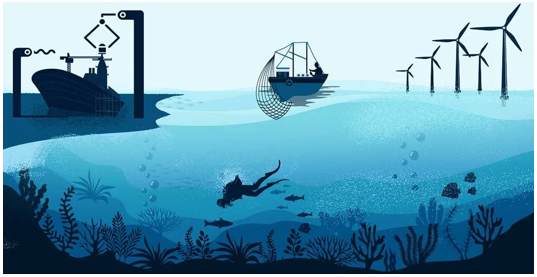i INP-WEALTHPK
Ayesha Saba
Balanced maritime governance, human capital investment, and private sector involvement are key to tapping the growth potential of Pakistan's blue economy and supporting ocean conservation, said Faisal Iftikhar, Chairman of Pakistan Fisheries Exporter

Association.
Talking to WealthPK, he said Pakistan's blue economy remained largely untapped due to a lack of a comprehensive maritime strategy. He pointed out that while initiatives like the development of Gwadar Port under the CPEC have brought attention to the maritime sector, there is still a significant gap in realising the full economic potential of Pakistan's marine resources. He stated that Pakistan needs to adopt a holistic approach to maritime governance, one that not only focuses on port development but also integrates sustainable fishing practices, coastal management and marine biodiversity protection. “Implementing policies for environmental protection is essential for the long-term success of Pakistan’s blue economy. Without such policies, Pakistan risks degrading its marine ecosystems, which would have severe consequences for industries like fishing and tourism, both of which rely on healthy oceans,” Iftikhar noted.
He further said that Pakistan's fishing industry, a critical part of the blue economy, was currently suffering from declining fish stocks due to unsustainable fishing practices. He pointed out that while Pakistan has considerable marine biodiversity, it lacks proper regulations and enforcement mechanisms to ensure sustainable fishing. He suggested that the government should invest in research and development to monitor fish populations and establish quotas and restrictions where necessary. Furthermore, he advocated for the use of modern technologies, such as satellite monitoring and data-driven fisheries management systems, to improve governance and compliance in the sector. Mehmood Khalid, former project director, CPEC Centre of Excellence, and head of Fiscal Policy Section at Pakistan Institute of Development Economics (PIDE), noted that Pakistan’s role as a maritime country was not just about economic growth but also about contributing to regional and global sustainability goals, including the United Nations Sustainable Development Goal 14, which focuses on conserving and sustainably using the oceans.
“A major challenge in advancing Pakistan's blue economy is the lack of human resource development in maritime industries. While Pakistan has made strides in education and training in other sectors, the maritime sector still suffers from a lack of skilled labour and professionals with expertise in marine science, maritime law, and oceanography,” he said. Khalid highlighted that if Pakistan is to fully harness its blue economy, it must invest in developing a workforce that can manage advanced maritime operations, environmental protection programmes and sustainable fisheries. He further said that the government needs to create a conducive regulatory environment that encourages private sector involvement while ensuring that environmental standards are upheld. “The integration of modern technologies, such as AI-driven marine traffic management systems and green energy solutions, could also help Pakistan modernise its maritime sector and increase efficiency.”
Credit: INP-WealthPk



